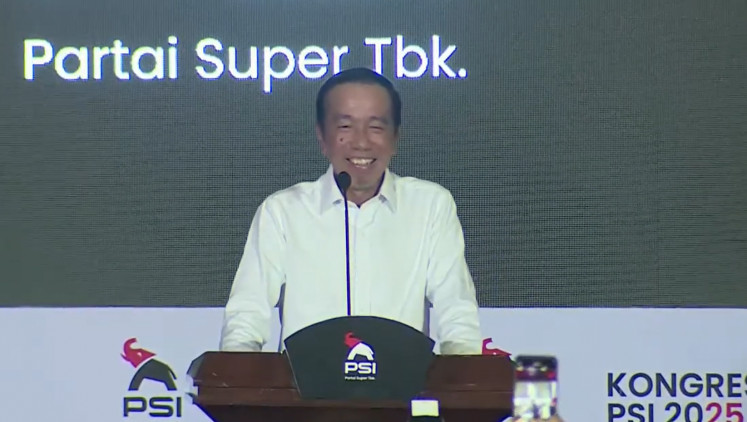Popular Reads
Top Results
Can't find what you're looking for?
View all search resultsPopular Reads
Top Results
Can't find what you're looking for?
View all search resultsIncome equality contributes to happiness
For centuries, people have looked for ways to improve the quality of their lives
Change text size
Gift Premium Articles
to Anyone
F
or centuries, people have looked for ways to improve the quality of their lives. Innovation has become the order of the day. Unfortunately, competition cannot be avoided, as people fight for survival in this callous world.
Competition means that people who are more capable and have better access to information will be wealthier than their unfortunate counterparts.
However, sometimes people forget the ultimate goal of their efforts, namely happiness. Wealth does not always mean happiness, while the poor do not necessarily always live unpleasant lives either. For example, in 2006, Bhutan, a small landlocked country on the eastern edge of the Himalayan Mountains, was crowned the “Happiest Country in Asia” by Business Week (https://www.theodysseyonline.com/bhutan-happiest-country-asia). The fact that this South Asian country is less prosperous than its Asian neighbors, such as India and Japan, has not prevented its people from being the happiest in Asia.
In Indonesia, the young province of North Maluku in the east of the country was named the happiest province in the national happiness index issued by Statistics Indonesia (BPS) in 2017. Like Bhutan in Asia, this archipelagic region is not among the richest provinces in Indonesia. So why are they happy? Are the people in these places really happy?
Attempting to understand the relationship between happiness and income inequality is indeed an important pursuit. The rising idea is, the more equal a community’s economy, the happier its people will be. Is that true?
By analyzing data from the 2013 survey on happiness around the world and the Gini coefficient issued by the World Bank, a pattern can be observed between the two variables. Based on the data, the big five in terms of happiness (Denmark, Norway, Switzerland, Netherlands and Sweden) each have a relatively low inequality index, while the five unhappiest countries show the inverse.
Meanwhile, statistical information in Indonesia tells a similar story. The winner and runner-up of the BPS’s happiness index last year, the provinces of North Maluku and Maluku, respectively, have comparatively low inequality vis-a-vis their two unhappiest neighbors, Papua and North Sumatra.
Of course, with such data only, the hypothesis cannot be proven academically. Moreover, to make a regression analysis, more comprehensive data is absolutely needed. Unfortunately, the happiness survey in Indonesia only began in 2013; hence, the required data is not available.
Luckily, several other studies support this article’s hypothesis. Maarten Berg and Ruut Veenhoven indicated in their research that income inequality did have a small influence on happiness, while Fumio Ohtake and Jun Tomioka also discovered a weak positive correlation between the two variables in Japan. Lastly, Alois Stutzer concluded in his research that larger numbers of happy and less unhappy people lived in less unequal countries.
These studies indicate that an increased level of happiness in a society is a splendid corollary of lower income inequality. This is an important fact the Indonesian government should take into account when setting policy.
Today, President Joko “Jokowi” Widodo is focusing much of his economic policy on infrastructure development. This policy approach appears to have had crucial impacts on reducing inequality. According to the BPS, Indonesia’s Gini coefficient decreased slightly to 0.38 in March this year, from 0.41 in 2014. It is plausible that this decline was the result of the positive effects of infrastructure development.
Surprisingly, Indonesia’s happiness index scores in 2014 and 2017 were 68.28 and 70.69, respectively — meaning that a higher Gini coefficient does not necessarily indicate a lower level of happiness.
Perhaps, within an economically equal community, there are no envious members, thanks to even purchasing power. People living in these circumstances may be happier than those who lived in the opposite situation. Additionally, a happy person is also less likely to do harm to others, and thus peace and security will be maintained. As a result, the government and local administrations could direct more of their energy toward leisure. So the better the income distribution, the better a country will be.
Consequently, to address inequality, several steps should be taken simultaneously. Not only should proper infrastructure be provided in every corner of the country, but people should also be assured of earning decent incomes. To attain these goals, the Pigou-Dalton principle of transfer can be of use. This principle calls for the transfer of wealth from the rich to the poor, as long as the transfer does not result in the better-off becoming poorer than the worse-off.
A tax policy and some kind of religious or social donation such as zakat (alms) are suitable means. By sharing the income of the rich with the poor, the gap between the better-off and worse-off will be reduced significantly. However, this would require the active participation of all segments of Indonesian society.
It is not only up to the government, but all better off people of Indonesia to take responsibility to ensure the nation’s wealth is distributed evenly. Historically, this country was established under the principle of mutual cooperation, known as gotong royong. Therefore, achieving the Pigou-Dalton principle, by paying tax and donating to the poor, should not be difficult in this archipelago.
Finally, if this approach is implemented, a happy, peaceful and tranquil Indonesia will be more than a dream. Friendly and blissful faces will decorate every corner of this beautiful archipelagic country, and most importantly, there will be no fear as no crime will exist. The goal may look ambitious, but hopefully it can be achieved in the near future.
____________________________
The writer works at the tax service office of the Finance Ministry Tax Directorate General in Ternate, North Maluku.










